I've been describing myself as a 'bit of a monk' for some time now which has been confusing to my friends. "Are you going to a monastery?" one recently asked. "Are you giving up your worldly goods?" asked another.
Let me explain. I mention monkhood because I'm a bit of a recluse meaning that I spend a good bit of time alone, unless you count the two dogs under my desk gnawing on bones and the cat perched on the desk purring out her eagerness for a treat.
 And when I consider my monkhood, I tend to think about how I'm like other famous monks.
And when I consider my monkhood, I tend to think about how I'm like other famous monks.
 I had considered comparing myself to Saint Benedict, there to the left, working at his desk under candlelight, just as I'm now working at mine, but without the candles.
I had considered comparing myself to Saint Benedict, there to the left, working at his desk under candlelight, just as I'm now working at mine, but without the candles.
 And Benedict has red slippers and so do I.
And Benedict has red slippers and so do I.
But I know that I've skipped over certain key aspects of Benedict's type of monkhood and it's clear that the Rule of Benedict with its focus on how to be obedient and humble and how to run a monistery efficiently, which if you've seen my home, isn't exactly me.
O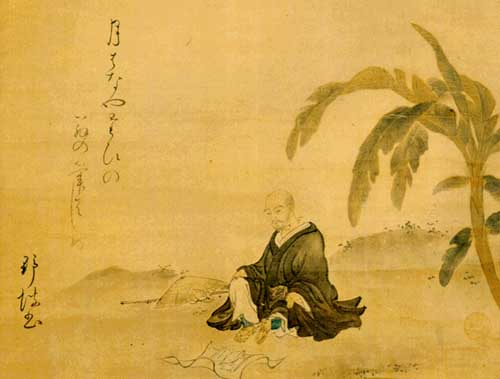 kay, if not Benedict, what about Basho?
kay, if not Benedict, what about Basho?
He was said to be a Buddhist Monk and writing haiku has been likened to a Zen practice.
 That's Basho to the right, sitting under his banana tree, perhaps contemplating his next poem or where he might get his next bowl of rice.
That's Basho to the right, sitting under his banana tree, perhaps contemplating his next poem or where he might get his next bowl of rice.
 And right now, I'm sitting under my roof penning this thoughtful whateveritis and thinking of going to the fridge for a treat.
And right now, I'm sitting under my roof penning this thoughtful whateveritis and thinking of going to the fridge for a treat.
So, who was Basho? And how else are he and I alike?
 he traveled a lot = so do I
he traveled a lot = so do I
 he walked a lot = so do I
he walked a lot = so do I
 he wrote poetry = I try
he wrote poetry = I try
 he ate rice = me too
he ate rice = me too
 he drank sake = I drink wine & beer
he drank sake = I drink wine & beer
 he didn't eat much = I'm on a diet
he didn't eat much = I'm on a diet
 he wore sandals = so do I
he wore sandals = so do I
 he wore loose, comfortable clothing = so do I
he wore loose, comfortable clothing = so do I
 he was balding = I confess that I've lost a few hairs
he was balding = I confess that I've lost a few hairs
 he used a hiking stick = so do I
he used a hiking stick = so do I
 he didn't watch TV or read the newspaper = I've recently given up both
he didn't watch TV or read the newspaper = I've recently given up both
 he liked flowers, plants, birds = so do I
he liked flowers, plants, birds = so do I
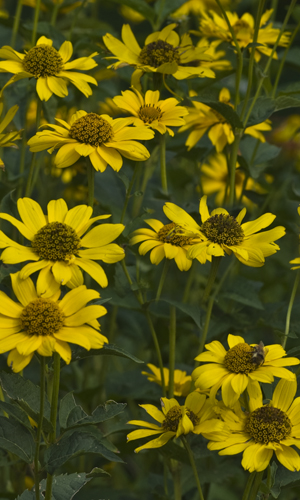 Breakfast enjoyed
Breakfast enjoyed
in the fine company of
morning glories
Traveling this high
mountain trail, delighted
by violets
Exhausted, I sought
a country inn, but found
wisteria in bloom
With a warbler for
a soul, it sleeps peacefully,
this mountain willow

 He felt his aloneness & age = so do I
He felt his aloneness & age = so do I
Lonely stillness –
a single cicada’s cry
sinking into stone
A solitary
crow on a bare branch –
autumn evening
along this road
not a single soul –
only autumn evening
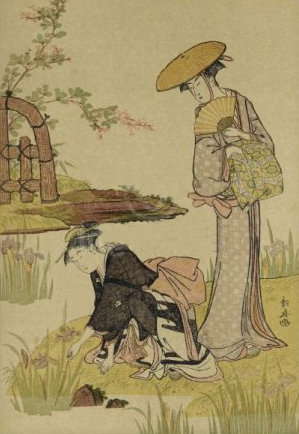
 He seemed to have liked or at least noticed women = so do I, especially the ones who also are a bit like monks. Why? Because they are on their own journeys, they they too live alone, and there's aglint of silver in their hair and a sparkle in their eyes. And for the most part, they've given up trying to reform the men in their lives.
He seemed to have liked or at least noticed women = so do I, especially the ones who also are a bit like monks. Why? Because they are on their own journeys, they they too live alone, and there's aglint of silver in their hair and a sparkle in their eyes. And for the most part, they've given up trying to reform the men in their lives.
How reluctantly
the bee emerges from the deep
within the peony
courtesan and monk, we sleep
under one roof together,
moon in a field of clover
 He enjoyed conversations while on the path = so do I, if you allow me to do most the talking.
He enjoyed conversations while on the path = so do I, if you allow me to do most the talking.
Long conversations
beside blooming irises –
joys of life on the road
 He had a spiritual philosophical side akin to a western monk's vows of poverty. I like to think that I too have a philosophical side although I admit that I'm not quite living in poverty. To my credit, I'm considering setting up a tent in the backyard.
He had a spiritual philosophical side akin to a western monk's vows of poverty. I like to think that I too have a philosophical side although I admit that I'm not quite living in poverty. To my credit, I'm considering setting up a tent in the backyard.
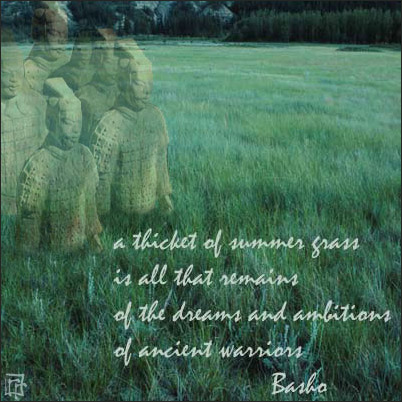 Come out to view
Come out to view
the truth of flowers blooming
in poverty
Ah, summer grasses!
All that remains
Of the warriors' dreams.
 Like me, he was perhaps a notch below tidy, he liked to eat, and he had a sense of humor.
Like me, he was perhaps a notch below tidy, he liked to eat, and he had a sense of humor.
my house
where even the mist
is sloppy
I go back into
my thatched hut...
the fly does the same
honestly –
even more than blossoms
I love dumplings!
 His poetry often reflected a melancholy about the transience of life. Some friends have commented that my writing tends to focus on melancholy, but at least I chuckle at all the clever jokes friends bombard me with via email. So consider this poem:
His poetry often reflected a melancholy about the transience of life. Some friends have commented that my writing tends to focus on melancholy, but at least I chuckle at all the clever jokes friends bombard me with via email. So consider this poem:
honestly –
even more than sadness
I love laughter!
~ zukki-ni
If you're wondering who zukki-ni is, the pen name is further proof that I'm a very happy guy and I'm sure you'll have a laugh when I explain it below.

 He saw himself as a wanderer = me too
He saw himself as a wanderer = me too
I'm a wanderer
so let that be my name –
the first winter rain
 And, after a long journey, he liked to get back to a comfy home = me too
And, after a long journey, he liked to get back to a comfy home = me too
Autumn approaches
and the heart begins to dream
of four-tatami rooms
 And, he dwells in his habits & routines = I do too
And, he dwells in his habits & routines = I do too
Winter seclusion –
sitting propped against
the same worn post
 As further proof, the image to the right is of me in Utah's Canyonlands, where I have been many times and where I return again and again to sit propped against "the same worn post", so to speak.
As further proof, the image to the right is of me in Utah's Canyonlands, where I have been many times and where I return again and again to sit propped against "the same worn post", so to speak.
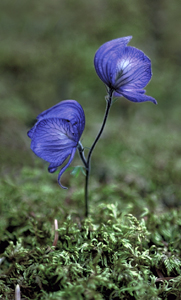
 Basho's birth name was Matsuo Kinsaku. He was once given a Banana Tree (Basho in Japanese) by a disciple and, deeply touched, he took on the name "Basho."
Basho's birth name was Matsuo Kinsaku. He was once given a Banana Tree (Basho in Japanese) by a disciple and, deeply touched, he took on the name "Basho."
 No one has yet given me a banana tree. However, I was gifted with a basket of zucchini last summer, and have taken on the pen name 'zukki-ni', which is Japanese for the vegetable most given as gifts by overly enthusiastic and ruthlessly sneaky gardeners.
No one has yet given me a banana tree. However, I was gifted with a basket of zucchini last summer, and have taken on the pen name 'zukki-ni', which is Japanese for the vegetable most given as gifts by overly enthusiastic and ruthlessly sneaky gardeners.
 I have already renamed my dogs "Basho" and "Banana Tree" and the cats, "Haiku" and "Haibun". In that sense, I feel that I'm often very close to Basho.
I have already renamed my dogs "Basho" and "Banana Tree" and the cats, "Haiku" and "Haibun". In that sense, I feel that I'm often very close to Basho.
 As final evidence of my monk's journey, my friend George has kindly offered to accept all of my worldly goods which after reading this, he assumed I will soon be renouncing. Indeed, I've decided to start gradually by sending him Basho, Banana Tree, Haiku and Haibun along with whatever zucchinis show up on my humble doorstep.
As final evidence of my monk's journey, my friend George has kindly offered to accept all of my worldly goods which after reading this, he assumed I will soon be renouncing. Indeed, I've decided to start gradually by sending him Basho, Banana Tree, Haiku and Haibun along with whatever zucchinis show up on my humble doorstep.
monkshood bloom –
the buzzing of bees
seems diminished
~ zukki-ni, published in Modern Haiku

Notes:
Revered as one of the greatest of Japanese poets, Basho was born in 1644, some 30 miles southeast of Kyoto. His name was Matsuo Kinsaku; he took the name Basho, which means, “Banana Tree” after he was deeply touched when a disciple gave him one as a gift. Throughout his life, Basho was drawn to the solitary path of a wanderer. Here's what he has to say about writing:
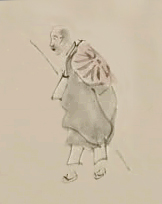 "In this mortal frame of mine which is made of a hundred bones and nine orfices there is something, and this something is called a wind-swept spirit for lack of a better name, for it is much like a thin drapery that is torn and swept away at the slightest stir of the wind. This something in me took to writing poetry years ago, merely to amuse itself at first, but finally making it its lifelong business. It must be admitted, however, that there were times when it sank into such dejection that it was almost ready to drop its pursuit, or again times when it was so puffed up with pride that it exulted in vain victories over the others. Indeed, ever since it began to write poetry, it has never found peace with itself, always wavering between doubts of one kind and another. At one time it wanted to gain security by entering the service of a court, and at another it wished to measure the depth of its ignorance by trying to be a scholar, but it was prevented from either because of its unquenchable love of poetry. The fact is, it knows no other art than the art of writing poetry, and therefore, it hangs on to it more or less blindly." (Introductory paragraph from The Records of a Travel-Worn Satchel, from a translation by Nobuyuki Yuasa).
"In this mortal frame of mine which is made of a hundred bones and nine orfices there is something, and this something is called a wind-swept spirit for lack of a better name, for it is much like a thin drapery that is torn and swept away at the slightest stir of the wind. This something in me took to writing poetry years ago, merely to amuse itself at first, but finally making it its lifelong business. It must be admitted, however, that there were times when it sank into such dejection that it was almost ready to drop its pursuit, or again times when it was so puffed up with pride that it exulted in vain victories over the others. Indeed, ever since it began to write poetry, it has never found peace with itself, always wavering between doubts of one kind and another. At one time it wanted to gain security by entering the service of a court, and at another it wished to measure the depth of its ignorance by trying to be a scholar, but it was prevented from either because of its unquenchable love of poetry. The fact is, it knows no other art than the art of writing poetry, and therefore, it hangs on to it more or less blindly." (Introductory paragraph from The Records of a Travel-Worn Satchel, from a translation by Nobuyuki Yuasa).
Notes: All haiku on this site with the exception of the ones attributed to myself are translations of Basho's haiku. The translations, for the most part, were by David Lanoue.

